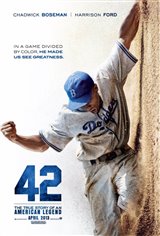Of the four sports Jack Roosevelt Robinson played when he was studying at the University of California, Los Angeles, surprisingly, baseball was his worst. Despite this, Jackie broke the color barrier and went on to become the first African-American to play baseball in the major leagues.
He was born January 31, 1919 in Cairo, Georgia and was raised in poverty by his single mother, with his four older siblings on a block where they were the only black family. Jackie attended John Muir High School and Pasadena Junior College, where he excelled in sports.
At UCLA Jackie was the school’s first athlete to win varsity letters in four sports: basketball, football, baseball and track. He was also one of four black players on the UCLA Bruins football team. During this time there were only a handful of African-American players that existed in mainstream college football, making the team the most integrated at the time. Though he was a great student and athlete, Jackie left UCLA just shy of graduation due to financial issues.
He moved to Honolulu, Hawaii to play football for the Honolulu Bears. However, when World War II called, Jackie entered the service and was a second lieutenant from 1942 to 1944. In 1944, he refused to sit at the back of a segregated bus, and he was subsequently court-martialed. He was eventually given an honorable discharge, but this courage and objection to segregation was just the first step towards the major impact he would have on the Major Leagues.
Jackie returned to professional baseball, starting in the Negro leagues. In 1946 Branch Ricky, president of the Brooklyn Dodgers, created waves when he chose Jackie for the all-white Montreal Royals. The Royals were a farm team for the Brooklyn Dodgers and on April 15, 1947, Jackie played his first game in Ebbets Field with the Dodgers, marking the first time an African-American athlete played in the major leagues.
From the beginning of his career with the Dodgers Jackie was tested. He heckled by the crowd, rejected by some of his teammates and received death threats from the public. Jackie held his head high and continue to perform to the best of his ability, leading the International League with a .349 batting average and .985 fielding percentage, and was subsequently asked to join the Dodgers full time.
The harassment didn’t stop. During a game against the Philadelphia Phillies, the opposing coach and team shouted racial slurs from their dugout. Some players on opposing teams and even some of his teammates refused to play when Jackie was on the field. Dodgers manager, Leo Durocher, stayed strong and told his players he would trade them before he would trade Jackie.
Jackie did have his supporters, however, including his teammate, shortstop and team captain Pee Wee Reese. During one game when a fan was voicing loudly his opposition to Jackie’s participation in baseball, Pee Wee Reese walked over and put his arm around his teammate. This simple gesture became a part of baseball history.
Jackie proved himself to be an extremely talented player at the professional level. During his first season, he hit 12 home runs. The Dodgers won the National League pennant that year, the first of six they would win with Jackie as their teammate. As time passed, and the victories piled up, Jackie went from being an outcast to a hero. He was the highest paid athlete in Dodgers history and opened the door for other African-American players, including Satchel Paige.
He retired from baseball on January 5, 1957, but in 1962, he went on to become the first African-American elected to the Baseball Hall of Fame.
Jackie was not only passionate about baseball but about equality for African-American athletes. He testified on discrimination in July 1949, and publicly called out the New York Yankees in 1952 for not allowing African-Americans on their team. He continued to serve as an activist up until his death on October 24, 1972 in Stamford, Connecticut, due to heart problems and diabetes complications.
He will always be remembered for his courage, and his mission lives on through The Jackie Robinson Foundation created by his wife, Rachel Robinson after his death. The foundation’s sole purpose is to provide scholarships and mentoring programs for young people, regardless of race or color. As well, in 2004, Jackie Robinson Day was initiated, to commemorate and honor the day Jackie Robinson made his major league debut. It's now celebrated every year and in recent years, all uniformed players and umpires have worn #42, Jackie's number, for the day.
